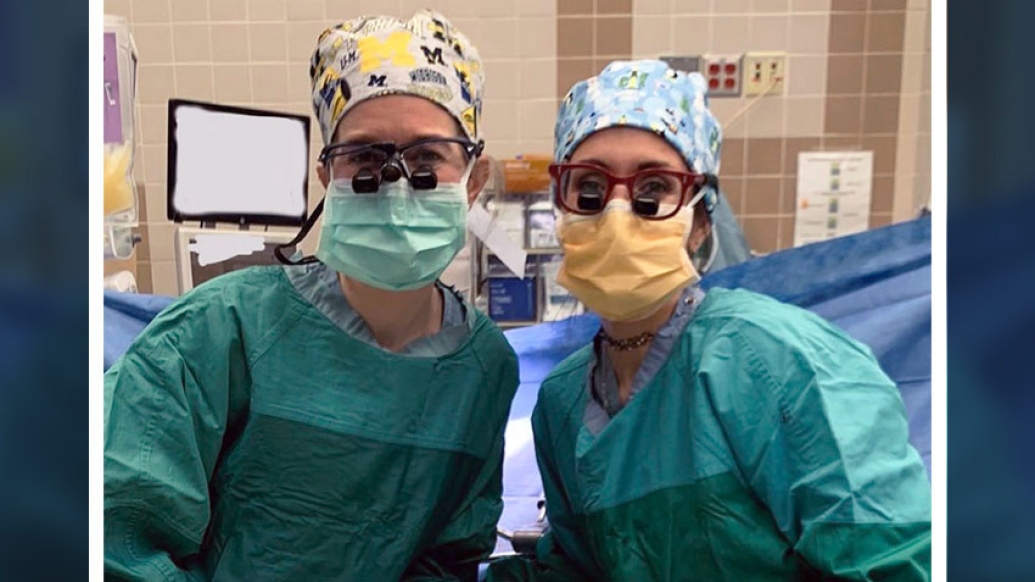First all-female liver transplant team at Michigan Medicine carries out a life-saving procedure.
10:01 AM
Author |

At first glance, it looked just like another liver transplant surgery at Michigan Medicine. There were surgeons, fellows, anesthesiologists, scrub nurses and more crowded into the operating room, prepping the patient and carrying out the hours-long procedure.
But it was no ordinary surgery.
A closer look revealed something historic for Michigan Medicine — it was a liver transplant surgery led by a team made up entirely of women, a first since the institution began performing such transplants in 1985.
'Women are discouraged from pursuing transplant surgery'
The procedure — which took place this time past winter — was led by Meredith Barrett, M.D., a clinical lecturer in transplant surgery. She was assisted by fellow Liza Sonnenberg, M.D.
For Barrett, getting to the point where she would lead a liver transplantation was a long-time coming.
First, she had to overcome the striking numbers: Only 12% of transplant surgeons in the United States are women.
Then she had to deal with expectations and negative reactions from peers and leaders at every step of her training.
"A lot of women are discouraged from pursuing transplant surgery because of the lifestyle," Barrett said. "I specifically was told it wouldn't allow me to raise a family and do the other things that society views to be a woman's role."
But having a family and being a surgeon aren't mutually exclusive.
"My male colleagues are all committed to their families. If men can do that, so can women," Barrett said. "Our team is working to promote the idea that having a life outside the hospital isn't impossible for a surgeon."
And that view is starting to spread — at Michigan Medicine and beyond, as Sonnenberg can attest.
"I have gone through a lot of training with women surgeons, including women transplant surgeons leading surgical divisions and national societies," Sonnenberg said. "Now I have multiple mentors in transplant who I look up to and learn from. It's an exciting time to be a woman in transplant surgery."
The numbers bear out that excitement. At Michigan Medicine, four of the last eight fellows trained have been women.
A complicated procedure
Both Barrett and Sonnenberg's hard work and lengthy journey culminated on that historic day this past winter.
But the surgery itself had taken months of preparation.
MORE FROM THE LAB: Subscribe to our weekly newsletter
"There is a lot that goes into a transplant procedure before ever even getting into the operating room," Barrett said.
For instance, a patient first needs to be evaluated for a medical need for transplantation. Then a social worker, nutritionist and others will evaluate whether they will be able to handle a rigorous post-operative recovery.
"There is a lot of bleeding and it's a really difficult procedure on the body," Sonnenberg said. "With organs being a scarce resource, we need to make sure patients not only can physically handle the surgery, but mentally handle the recovery, as well."
Once approved by all teams, an organ needs to be identified and retrieved. Then the surgery itself can begin.
"Overall, the procedure will take between six and 15 hours," Sonnenberg said. "The first portion is handled by a team from anesthesiology, typically a faculty member, fellow and resident and anesthesia techs."
After that, Barrett and Sonnenberg prep the new liver and remove the old liver. While the surgeons operate, other team members monitor the patient and their vitals closely to ensure they are stable and can provide good blood flow to the new liver.
Once the new liver is sewn in, the team members work diligently to ensure it is functioning properly and the patient is not having significant bleeding before completing the operation. After many hours in the OR, the patent is transported by both the surgical and anesthesia teams to the surgical intensive care unit for ongoing monitoring and critical care.
Making it 'just another day'
In all, the surgery was a success, with the patient now home and recovering well.
"I truly feel like I have the greatest job in the world," Barrett said. "I get to take something tragic, like somebody passing away, and then transplant one of their organs to save somebody else's life."
And to do that in a historic way is just as satisfying.
"For so many, when they see a woman or any other minority in leading roles, they no longer need to question whether there's a spot for them," Barrett said. "There is a place for you here and not only is there a place, but we have a desperate need for you. The more diverse our care teams are, the better our care is."
Hopefully, the recent all-female surgery approach will only be the first of many more to come.
"It didn't really occur to me at the time that an all-female liver transplant was a big deal as I had seen many all-female transplants in my residency," Sonnenberg said.
In which Barrett added: "We know things are changing rapidly. And hopefully — eventually — this will become just another day at Michigan Medicine."
This article was originally published by Headlines.
This piece was additionally reviewed by Ridhima Kodali

Explore a variety of healthcare news & stories by visiting the Health Lab home page for more articles.

Department of Communication at Michigan Medicine
Want top health & research news weekly? Sign up for Health Lab’s newsletters today!





